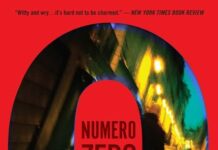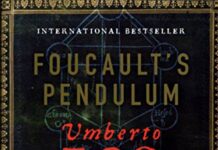
Ebook Info
- Published:
- Number of pages:
- Format: EPUB
- File Size: 2.93 MB
- Authors: Umberto Eco
Description
The Prague Cemetery is the #1 international bestseller from the award-winning and New York Times best-selling author of The Name of the Rose, Umberto Eco.“Vintage Eco…the book is a triumph.”—New York Review of Books Nineteenth-century Europe—from Turin to Prague to Paris—abounds with the ghastly and the mysterious. Jesuits plot against Freemasons. Italian republicans strangle priests with their own intestines. French criminals plan bombings by day and celebrate Black Masses at night. Every nation has its own secret service, perpetrating forgeries, plots, and massacres. Conspiracies rule history. From the unification of Italy to the Paris Commune to the Dreyfus Affair to The Protocols of the Elders of Zion, Europe is in tumult and everyone needs a scapegoat. But what if behind all of these conspiracies, both real and imagined, lay one lone man?“Choreographed by a truth that is itself so strange a novelist need hardly expand on it to produce a wondrous tale…Eco is to be applauded for bringing this stranger-than-fiction truth vividly to life.”—New York Times
User’s Reviews
Reviews from Amazon users which were colected at the time this book was published on the website:
⭐This book is about the power of information. It’s about the people who fabricate it for others with hidden agendas. It’s about the results of that information on its victims, the public, and rival countries. In essence, a propaganda war took place in view of the French and Italian public, who had no idea the real purpose behind the exciting events and headlines that were staged like theater. It later had a devastating result in other countries on a people who were truly innocent.The results included bombings, riots, murders and mayhem. Most tragically, attempted genocide…That is an example of the power of information.Obviously, there is much more to it than that, but let us go on…If we expand the operating theater to countries, we have governments with spy services, secret societies, powerful religious organizations, which are like countries and secret societies in one, AND you control central sources of information, it’s called Propaganda.It is also POWER.If you play this game, you have to be very careful. Not only do you have enemies from other countries, but from religious sects, secret societies and double agents. If you are very lucky, you disappear to a foreign country, under an assumed named without your family, but you do get a pension from the service.If you were unlucky, and many were, days of torture followed by a longed for death was a common end. The stakes were high, but so was the pay and the rush.Our story takes place in the late 19th Century. The industrial revolution is taking off. Technology is about to blow the roof off the world, and few have any clue what’s coming. Democracy worked in the states, even though we are considered upstarts on the Continent. Europe is writhing. Democracy failed in France thanks to Napolean, though they get a second chance after his heirs are ousted. Italy went to war for democracy with Garibaldi, and lost, so hatred of state and altar festered. The main reason for the turbulence, other than historical disputes, border wars and failed revolutions is propaganda.REMEMBER, INFORMATION IS POWER.SAY IT THREE TIMES, IT’S IMPRESSMENT!Does anyone have a feeling of deja vu here?Can you say Hallelujah?If you don’t believe me, you must be watching the Kardahians far too closely to notice all the things the media DOESN’T cover.Government factions controlling the media want to send a specific message to whatever target, and to keep the masses entertained so that they won’t know what’s really going on. They also use the media to make the populace believe certain situations are by default true. Things like all cops are evil, all guns kill, all Muslims are terrorists.If you have ever studied logic you would understand the easy fallacies of these simplistic arguments, all you need is one example of good in each group and the argument falls apart.If you have been paying attention, then you know this book is as relevant today as it would have been explosive in the late 1800s.So let us continue with the review. Spymasters from different countries want to screw with each other using the secret societies, the revolutionaries, the Jews, different sects of the Catholic church and the Satanists as a three ring circus for the entertainment of the people, and to mask their own agendas.Now who is our ring master?Simone Simonini our narrator.Eco wanted him to be the most execrable protagonist in literature. To me, it is a toss up between Simonini and Fantazius Mallare. Ben Hecht wrote about him in the 1940s. The rant of all the people he hates, and why, forms the prologue to the self titled book. They are both insane in different ways. I do think Simonini takes it by a slim margin.Still with me?So, back to Simonini, he is amoral, creative, literate, and a huge foodie with MPD. While many readers believe he is antisemitic, I believe his Grandfather scared him so much as a child with tales of Mordechai will get you, that he is physically scared of Jews. They are akin to the Boogie Man for him. He doesn’t actually see a Jew until well into his adult years, and shows curiosity not hatred.Simonini, through his two personalities ends up crafting information for all sides. Ringmaster, remember… He does it for money and pride – his stories have to be better than the competition. He doesn’t care who gets hurt, or what occurs based on what he crafts. When someone gets in the way, he has a handy sewer waiting for them. But, give him a Creme Brule and all is right with the world.Information as Power. Unfortunately, such information in the wrong hands, which are those typically wielding such tools for power, can result in horrific tragedy.I would recommend this book to every critical thinker in the world who has access. All the historical events and people were real beyond the narrator. There are many lessons we still have to learn about our governments. Let’s start here!
⭐This review contains a bit about the current state of free speech and our willingness to accept every voice in the argument, rarely considering the motivation of said voices. If there are political views expressed in this review, they are informed by The Prague Cemetery, Umberto Eco’s novel treatment of the development of perhaps the most evil piece of fiction ever concocted.The Prague Cemetery by Umberto Eco is the perfect type of book to read with ready access to the internet. In fact, I can’t imagine reading this book without the instantaneous aid of online research facilities. Using online resources, the reader can begin delving into deeper source material to discover that this twisted tale of political intrigue and espionage is based on historical facts. Perhaps knowing that fact up front, will keep some readers going through the long slog of the three part narrative.The original editions of the antisemitic work referenced throughout The Prague Cemetery, were indeed written by the characters mentioned here. I don’t know enough of the history to say where truth ends and fiction begins, but that blurring of the historical in the novel is part of what makes Umberto Eco’s writing such an excellent introduction into his semiotics and philosophy.Presciently, Eco stated before his death that social media was being misused and he saw it as a growing concern. The fact that demagogues now have an open platform to share their views, somehow makes the fact that Henry Ford paid to have half-a-million copies of the worst type of hate literature printed, pale in significance. The book Ford had printed, and its history as a 19th century sensationalist phenomenon, led directly to the “final solution”. That is the book at the very core of this novel. A forgery protected by “free speech” and often quoted by Hitler in “Mein Kampf”.Where are we headed today?“Social media gives legions of idiots the right to speak when they once only spoke at a bar after a glass of wine, without harming the community. Then they were quickly silenced, but now they have the same right to speak as a Nobel Prize winner. It’s the invasion of the idiots.” – Umberto EcoDisinformation once promoted in print by an antisemitic American industrialist, can now be spread much more widely and effectively. At the dawning of the age of the internet troll Eco produced this novel on the anti-intellectual roots of 20th century antisemitism. Can it do anything to stop the tsunami of fear and hate mongering online today? We now live in the era of the unabashed, unrepentant troll, who feels no compunction to seek the truth, nor desire to let thinking interfere with his world view. And if we, the readers of Umberto Eco, complain that the views expressed by the trolls are nothing more than the warmed over remnants of 19th century charlatans, we are accused of attacking “free speech” along with the 21st century freedom to hate on a grand scale.How will we teach the coming generations any truth, when it appears that their ideas and views of the world are being misshapen daily by those willing to mix a specific dose of hatred with a calculated misspoken half truth, or as it is more simply referred to: lies. We can no longer call out our politicians as liars. For some reason, now, when people misquote facts, embellish lies with greater lies and sell it all — to a public gleefully willing to buy it at exorbitant rates — those who oppose the shilling hucksterism of populist demagogues are accused as socialists, communists, or worst of all: intellectuals. This is eerily similar to the world described in The Prague Cemetery.Intellectuals faced with a crisis of believability where science, facts and historical data are concerned, are forced to confront a world safe in its own truthiness. All of these themes are presented in this novel that could be describing our own future, by uncovering our very real past. Accepting the views of the hucksters and throwing the expeditious criminals into jail has real consequences for a society. If we choose to disentangle ourselves from the hard truths that bind us together, we may find that we have set sail adrift on a current of half truths that can only lead to tragedy.The fact that the ultimate goal of the actual work being written here in Eco’s novel, is considered by almost every author as secondary to the will for political power, money and greed certainly doesn’t portend well for a society built on internet hate-bait, anger-click, yellow churnalism that seeks to maximize revenue, casually disregarding the facts. The problem is: Truthiness has never set anyone free.
⭐This is a somewhat longwinded historical novel set in the Nineteenth century world of “The Protocols of the Elders of Zion”, a notorious anti semitic literary forgery that has spawned countless conspiracy theories (and pogroms).The basic plot is that the whole affair was the unintended outcome of a would-be secret agent trying to ingratiate himself to his various employers. Eco’s spin however is that all the unbelievable characters in the story actually existed in real life (including the shadowy agent) and the various bizarre strands of the story really happened (sort of). Good if you like a lengthy “couldn’t make it up” story filled with obnoxious anti-heroes.
⭐This is a wonderful yarn crafted by Umberto Eco around a number of conspiracies and somehow making it all seem believable. Whether you’re a conspiracy theorist or not, you will love this. To somehow tie together the “Dreyfus” affair and the “Protocols of Zion” is sheer genius. I had read “Foucault’s Pendulum” some years ago and so I expected this book to be exactly what it was, and I wasn’t disappointed. Eco is the thinking man’s Dan Brown but oh, so much better. I’m very glad I rediscovered Umberto Eco and intend to read all his books, some for the first time and some once again.
⭐This book was tough going all the way through. And sadly, there was no sense that justice was ever served. I understand why Eco felt it necessary to create such a disagreeable main character, but I honestly felt depressed at the nasty things that he continually got away with.Tackling the historical origins of modern anti-Semitism is invariably going to bring the reader into contact with the worst kind of cruelty humans can inflict on each other, so as a quasi-historical treatise this may have academic value. But personally, I found the anti-Semitic sentiments and the personal and moral attributes ascribed to Jews page after endless page eventually hard to stomach.
⭐Oh boy! What a drag this one was to read. I kept hoping it would get better, less convoluted/more to the point but it just kept going on and on. I did get to the last page (so technically finished it) but I really skimmed through the last 20%. I’m just really glad it’s over…an unfinish-able 1-star rating from me.
⭐This book is about the rise of anti-semitism in European politics. It’s a look at real events through the eyes of some very sceptical characters including a host of familiar names from history. Eco’s turn of phrase, dark humour and post-modern approach will be familiar to those who have read his work before. If you haven’t read any of his books before, then I wouldn’t suggest starting with this one. It is certainly not a thriller, a mystery, or an adventure story in any sense. I enjoyed it, but this book was not what I expected it to be.
Keywords
Free Download The Prague Cemetery in EPUB format
The Prague Cemetery EPUB Free Download
Download The Prague Cemetery EPUB Free
The Prague Cemetery EPUB Free Download
Download The Prague Cemetery EPUB
Free Download Ebook The Prague Cemetery


